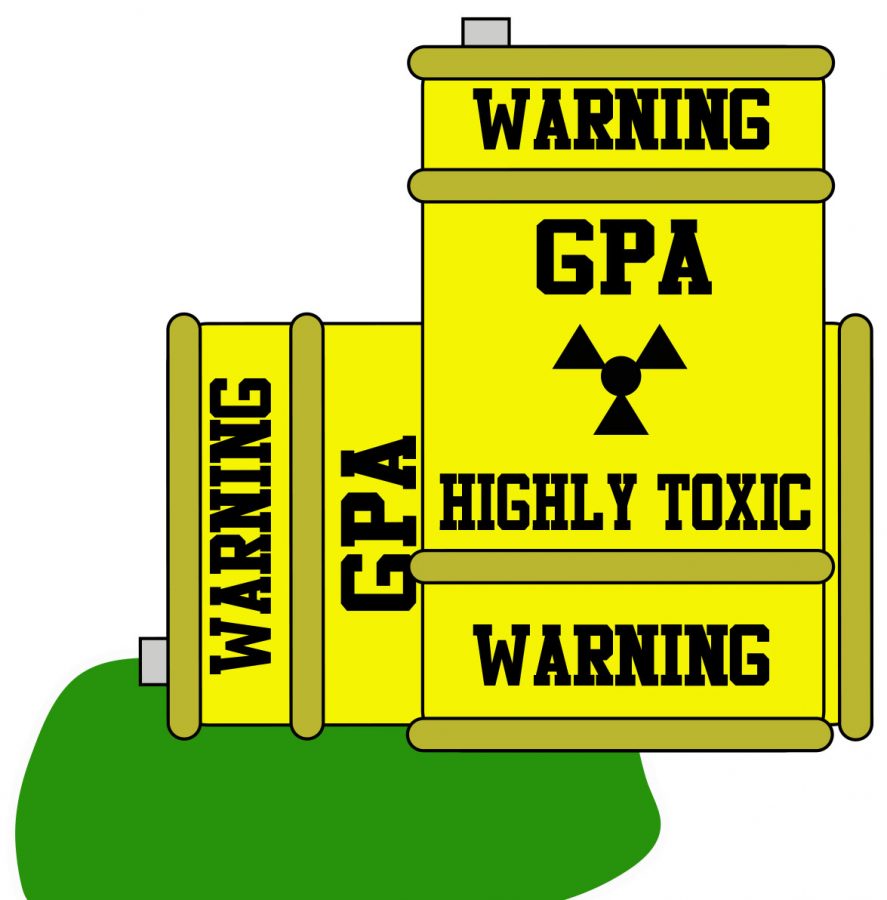Toxic GPA: Obsession with grades infects minds of students
Just a couple months ago, my dad and I were looking over school papers from the first semester. He saw my fitness report and said, with confusion on his face, “Why did you only do 10 push-ups for the first test, but tripled that for your second one?” I just laughed it off and said, “Well that’s all I needed for an A.”
Inherently, I had realized for several years how school was a competition to many, but going into my junior year it became more apparent. GPAs, specifically, have consumed students’ lives and become more important than learning itself.
A TSP survey of 168 students showed 68.6% of students used check their GPAs more than once a week, before PowerSchool disabled them. On top of that, 73.6% of students felt stressed out with their GPA not being displayed on PowerSchool. The overwhelming statistics just go to show that students have gone past being interested in keeping up to date with their grades. Instead, they have become dependent on being able to addictively check a three decimal digit on their phones.
This seems like the norm to us as the ability to see our grades has become much more accessible in the past decade. However, it is interesting to see how older generations are more shocked by this obsessive culture because it is so different than how it was when they grew up.
Dr. Young, Director of Programming and Data analysis, explained, “I only thought about my GPA twice a year, when I got my report card…I would have had to go to the guidance office and ask them to print it for me…it’s a totally different world.”
Coming into junior year, this toxic culture has become more apparent. With taking SATs alongside several courses, many students have all packed on, it seems that there is a big test every week. That being said, students are definitely more pushy, to say it the nice way, on what grades others are getting.
It seems like after getting a test back there is always a chorus of, “Wow my GPA is about to drop,” or laughs followed by “Dude, you’re screwed,” when someone shares their grade.
This obsession is so widespread that even administration has come across instances of it and noticed it.
“Teachers will tell you that the second they update a grade, someone’s emailing them right away. Kids are constantly monitoring their grades, and there’s a culture around that.” Dr. Young said.
The most problematic part of this fixation on GPAs is that it is overtaking the actual desire to learn. Rather than wanting to learn the content and do well on tests, students see school as a numbers game where they will take any route for an A, even if it means they didn’t learn honestly.
Sean Sima (11) has noticed this over the years and said, “Most students do care more about the GPA than their understanding of material.”
Some may argue that this infatuation with grades is justified since GPAs are a way to see the average of one’s current or cumulative grades. They also take into account honors and AP classes, so some may say they can accurately compare and show the work AP students put in versus students who take regular courses. With all this in mind, checking GPAs so often is explained to us as a good way to keep up with grades.
However, a school-conducted survey states that 49.7% of students feel GPAs don’t accurately reflect their academic efforts. This being said, isn’t it ironic how more than two thirds of students are meticulously checking their GPAs when most of them feel it isn’t even an accurate representation of their efforts in school?
To explain it honestly, the mania of checking grades and comparing yourself to one another has toxified schools and only ends up hurting students. Instead of learning material properly, students have found loopholes and continue to be hung up on every tiny assignment being put into the gradebook. They instead need to take the higher road and try to focus on school itself rather than the shifting numbers in their PowerSchool app.
School has unfortunately turned into a numbers game for many, but rediscovering the importance of actual education is crucial in breaking this infatuation and making school more sincere and beneficial for all.

